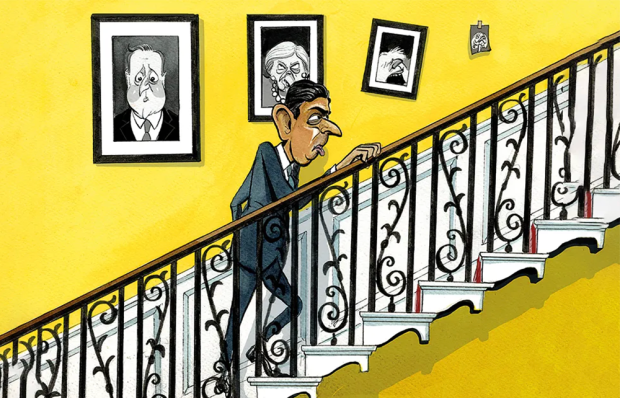It is 18 years since the last Colditz drama on British television, which apparently means we need a new one. And the times being what they are, it appears that the drama will have to reflect the values of our little cultural-revolutionary period.
Like most adaptations of already well-known stories, this one will be based on a book by Ben Macintyre. He is a fine popular regurgitator of history who has previously brought to public notice such things as the hitherto untold story of a spy named Kim Philby. The television adaptation of that book, A Spy Among Friends, was well-acted, though marred by having a working-class northern woman as an MI5 officer. To make her even more saintly she was also married to a black man who had come to Britain to give his life working for the NHS.
This whole strand of the story, you may be surprised to hear, was fictional. But that is the way with these things now. You can’t just have a nice spy story about British heroes and villains. If it is set in the pre-multicultural era, everything must be retrofitted so that the past more exactly resembles the present.
Viewers of the forthcoming Colditz have even more treats in store. Last weekend Macintyre told the Hay literary festival that the adaptation of his latest book would dismantle the ‘mythology’ of Colditz. This ‘21st-century narrative’ view of events at the camp will apparently especially focus on the ‘appalling racism’ at the castle. Not the appalling racism of the German guards, mind. Rather, the appalling racism of the British officers imprisoned there. Douglas Bader, for instance.
Macintyre told his Liberal Democrat audience that Bader – perhaps this country’s most celebrated Spitfire fighter ace of the war – was ‘a monster… racist, snobbish, brutally unpleasant to anyone he considered of a lower socioeconomic order’. These are just some of the important elements that will apparently blow apart the ‘myth’ of Colditz. I hope that people without legs point out that Bader was one of theirs and tell Macintyre where to stick it. This might be the only way to fight to a stalemate.
The Colditz news came at an interesting time. Within hours of that story breaking, I learned that there are to be no such people in history as the Anglo-Saxons. Cambridge University has apparently decided henceforth to teach that they did not exist as a distinct ethnic group. It is part of what the university describes as an effort to undermine ‘myths of nationalism’, specifically an effort by the Department of Anglo-Saxon, Norse and Celtic to make its teaching more ‘anti-racist’ and ‘dismantle the basis of myths of nationalism’.
I wish that someone had thought of that a couple of decades earlier. Instead of sweating through the night trying to memorise all of Beowulf to pass my Anglo-Saxon translation exam, I could have just said: ‘No such people ever existed. As an anti-racist I know this to be true. Therefore I am dismantling this exam.’
Of course the uniting oddity of these efforts to dismantle, problematise and indeed disappear our history is that it is only our own ‘myths’ – and truths – that must be so dismantled. It is only we who must have any heroes who demonstrated extraordinary heroism and stoicism ripped from us.
Likewise, it is the ‘first peoples’ of these islands who must be disappeared. I do not notice anybody trying this on any other nationalities. It might be thought slightly rude to go to Australia, say, and tell the Aboriginal peoples that they need their ‘myths’ taken away from them and oh, by the way, your ancestors didn’t exist. Try it with some Native Americans and see how far you get. Yet so long as those being robbed of their history are white and British, it’s all fair and good. All part of some kind of ‘levelling’ that is being attempted in our society.
One sign that it fits into some grander project can be told from the fact that while our own history is being rewritten or erased altogether, we are inventing myths that favour other groups. Consider the recent Netflix series in which Cleopatra was played by a black woman. The doolally, race-obsessed Americans responsible for the series decided that Cleopatra was not a Macedonian, but an African. In fact she was a sort of early, prototype African–American. Needless to say, the decision to cast her like this was inspired by another of the most recognisable characters of our age: the ‘strong woman’. Our age has an extraordinary desire to show young women that there were strong women – and especially strong African-American women across history. Especially in Ancient Egypt. As they say: ‘Yas, Kween.’
That Cleopatra actually was an absolute monarch and owned many slaves is apparently not the point. We are simply meant to accept the narrative that it is not sufficient to claim black Americans built America – now they must be said to have built the world. Always in a very kind and caring way, of course.
I cannot be the only person who notices the asymmetry at work here – the effort to rip apart our own myths and truths while inventing wholly new myths about other groups of people. The former always being negative, the latter always being only ever positive.
Naturally all this is an insult to the very idea of historical truth. But it is also a specific insult to the British public. I don’t know how many people are in favour of the heroes of Colditz being turned into racist monsters. But I doubt that there will be many who favour this while African-Americans are turned into gods of Ancient Egypt. A certain unfairness seems to be at work. So let me suggest that we right it. Here would be my deal. We are allowed to have our heroes and you are allowed to have yours.
Got something to add? Join the discussion and comment below.
Get 10 issues for just $10
Subscribe to The Spectator Australia today for the next 10 magazine issues, plus full online access, for just $10.
You might disagree with half of it, but you’ll enjoy reading all of it. Try your first month for free, then just $2 a week for the remainder of your first year.















Comments
Don't miss out
Join the conversation with other Spectator Australia readers. Subscribe to leave a comment.
SUBSCRIBEAlready a subscriber? Log in